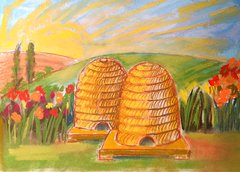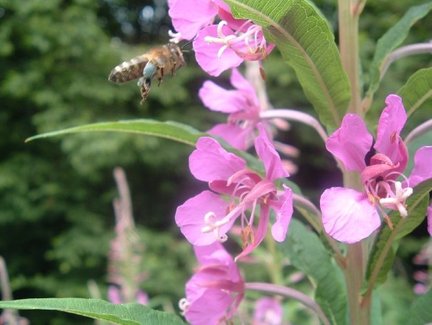01227 833802 07895 191 385 info@northdownsbees.co.uk
North Downs Bees
Breeders of varroa-resistant honey bees offering tuition and nucleus colonies
The Natural Rise of Resistance to Varroa
Given the right conditions feral populations are known to develop resistance to varroa through natural selection for the fittest strains. If the right conditions can be arranged, beekeepers can capture and amplify this quality.
We wanted to see if resistance could be supported, to a point where an apiary could be productive without recourse to treatments. We set out to test the waters by hiving collected swarms and cut-out colonies, simply leaving and monitoring them.
Traditional Husbandry
Aside from the unusual source of stock, what we have done is applied a mix of natural selection and a careful application of the methods of traditional husbandry. This is how plants and animal stocks have been kept healthy for thousands of years. These methods are well suited to the art of beekeeping - for this reason: bees mate openly. That means that if unhealthy individuals are medicated, rather than having vulnerability bred out, unhealthy genes are passed to the next generation. This continually undercuts the development of resistance.
North Downs Bees has grown from an experiment begun in 2009. We wanted to explore a question: had, almost twenty years after the arrival of varroa in Kent, a significant degree of natural resistance developed in local feral colonies?
Taking those colonies found to be the most enduring and vigorous, and using methods developed by one of the leading exponents of resistance breeding, Dr. John Kefus, we have arrived at a position where a good proportion of our completely untreated hives thrive and produce a good honey crop year after year.
Mite-managing Bees
Our experiment is ongoing, and we are fine-tuning out methods year on year. Thus far the results show steady improvement. Our bees are increasingly equipped to manage their own mites. We now have a better overwintering rate than the average in treating apiaries.
We will soon be offering bees likely to possess a good measure of resistance to varroa for sale as nucleus colonies. We won't, at this stage, make any stronger claim for them than that. But with very good reason we believe they will stand a dramatically better chance of thriving unaided than any commercial bees you can buy, or any colonies originating in treated apiaries in the UK.

